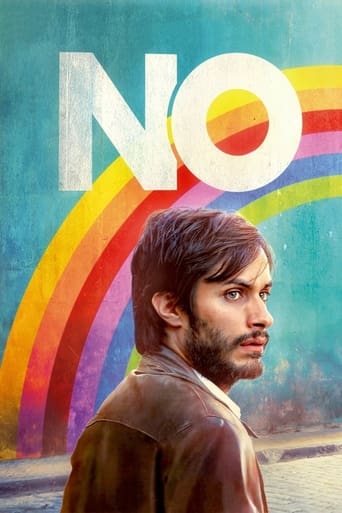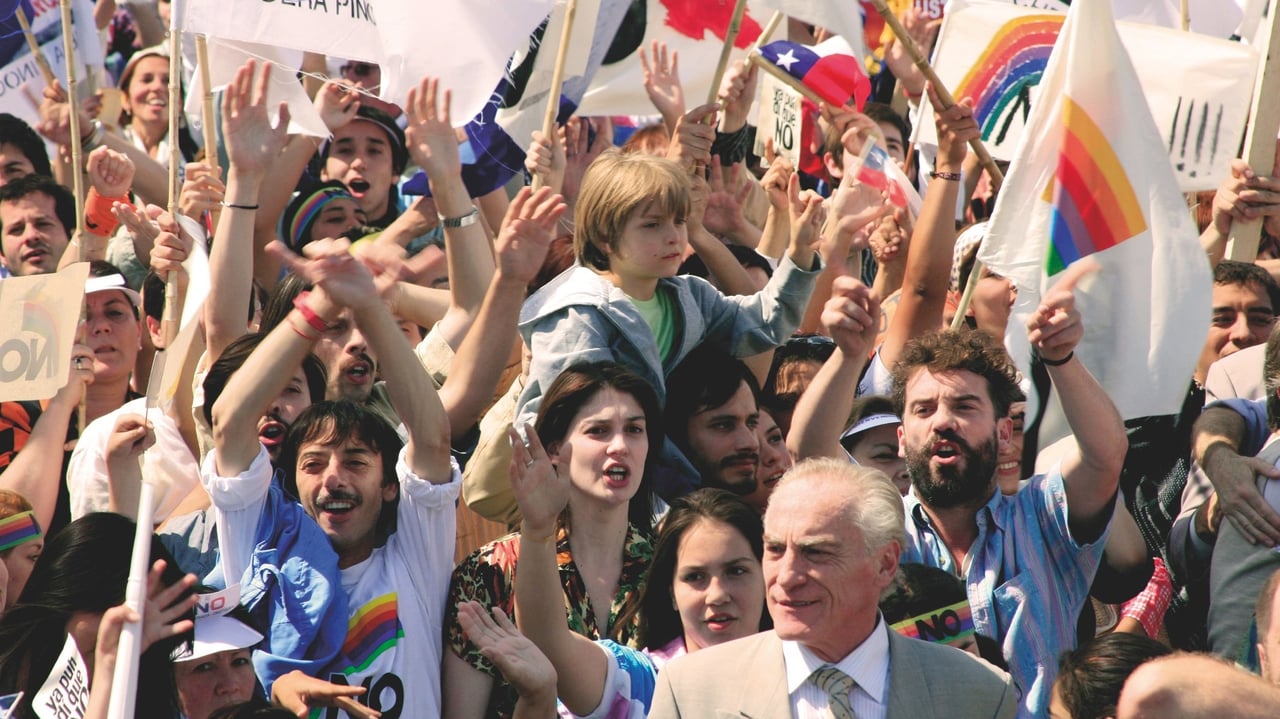ehk2
This movie is brilliant and it is relevant today as never before. I don't think it praises or prioritizes political marketing over political idealism or grassroots activism. It is a very realistic depiction of politics in mass media era -a bit cynic maybe- (Surely, the yes vote became possible in Chile not just because of a single ad. But this is a movie=dramatization). A viewer can and should watch a movie critically. She has to learn to evaluate and fill the absences herself; see the underlying points and judge whether it ultimately tries to destroy the reality, mislead us or not.For me, this is quite an intelligent, thought-provoking, self-reflexive product. And, it is especially relevant for us, living in Turkey, at this very moment, before a referendum in which our leader wants to establish a one-man rule through one.
I_actually_am_sam
This is a well-made, stylistically heavy, slightly whimsical view of the the 1988 plebiscite to unseat Pinochet as Chile's autocratic military ruler. The first thing to say is that as a period piece, the late 80's are rendered in all their grainy, blotchy glory using what I can only assume is technology from that time, and while at times this can be a bit off-putting (the wobbly camera work is reminiscent of "found footage" type movies) eventually it becomes just part of the furniture.It is also a satirical look at the advertising industry, not just in Chile, but in general. One of the leading lights of the industry in Chile is Gael Garcia Bernal's character who is approached to run the No campaign. He applies all of his cynical abilities in selling "No" as a product to the undecided or the non-voters, much to the disgust of those who have suffered brutally at the hands of Pinochet's regime. He is also pitched against the owner of the advertising agency he works for who decides to work for the Yes campaign.We get a very narrow view of the plebiscite here. There's no real look at how all of the political parties (12 or so) that are against Pinochet all managed to unite for the single cause. The focus is very much on the campaign itself and the pressure put on the campaigners by the Government and the Yes side. The scenes of the protests and riots are brilliantly shot, mixing old newsreel with staged shots.There are plenty of funny moments too, particularly when they are first trying to decide on a theme for the No campaign and the ideas they are coming up with are laughable.Well worth a look.
jdesando
"Faith is what will change Chile." Saavedra (Gail Garcia Bernal)1988 was not a good year for August Pinochet, the dictator of Chile: after 16 years, he agrees to a referendum that simplified the topic by having the electorate vote either "Yes" or "No" for his rule. One of the reasons he lost, notwithstanding the number of murdered or vanished enemies, was adman Renee Saavedra (Bernal), the brains behind the commercial for soft drink "Free," featuring mimes and rock musicians among other images.While this docudrama gives an effective perspective on the fall of a tyrant, it also shows the successful inside working of an ad firm, which seemed not to have a chance given the perception that Pinochet had a lock on the election process. Not so. It's instructive to see how much Saavedra's belief in selling the upbeat emotion of the soda makes a difference in the final outcome, and that good does sometime overcome evil.One of the more successful aspects of the film is its use of vintage video cameras, which allows the director to smoothly incorporate original TV commercials and news footage. In other words, No is an enjoyable thrust back into history, as good a look at the underside of Latino politics and propaganda as you will ever see.
veritasartsinc
In elections, people seem less moved by the truth than by their desires. A point made very well in Pablo Larrain's excellent drama about the Oct 5 1989 referendum that ended the 15 year reign of military dictator Augusto Pinochet in Chile.Pinochet's government, compelled by international pressure, is forced to hold a referendum or plebiscite, on whether the government should continue. Gael Garcia Bernal plays Rene Saavedra, a cynical ad man who is tapped to head the "NO" campaign, which is allotted 15 minutes of TV time per night, for a month to make their case on why Chileans should vote "NO" to another 8 years of Pinochet. Meanwhile the Pinochet government follows with their 15 minute "SI" campaign, and in reality the control of the rest of the mediaFrom the outset Bernal rocks the boat as he dismisses his group's desire to air their grievances about Pinochet's political kidnapping, torturing, and executions, in favor of the political equivalent of a Mentos commercial. Bernal is not received well by his compatriots, who accuse him of trivializing, but Bernal is convinced that the Chileans don't want to dwell on the negative past, but want a positive vision of a future of liberty and happiness. Yet this vision, comically, is reduced mostly to musical montages of people dancing, singing, mimes, and kids running through fields. Larrain expertly captures the silliness of 8o's style ads. When Bernal seeks a musical theme for the movement, he insists to the songwriter that he's not looking for an anthem, he wants " a jingle".In the meantime, Bernal's boss is working against him in the Pinochet campaign;his estranged wife is in and out of jail as a political activist; and he cares for his young son. Things begin to get dangerous when pro-Pinochet thugs begin to harass and intimidate the NO campaigners.Larrain holds our attention in this taut drama. He enters in and out of what could be cumbersome political dialog deftly. Though surely the whole story of the Pinochet demise is not told here, the particular way in which the ad men help take down a dictator is riveting. Seldom has a birth of a democracy been more inspirationally depicted.Using video cameras made to deliver images that bleed like the early video cameras of the 80's was an unfortunate choice though. In trying to capture the essence of the time, presenting a documentary feel through video, or perhaps the ugliness of the time, Larrain has only succeeding in distracting and making an exceedingly ugly-looking film. Too bad, for so much else here is superlative.Bernal's character is very detached. We never get a real sense of his emotional involvement in the campaign and its significance to him. This seems to be the point. He comes off like the quintessential , detached professional. From the beginning, he seems more like a careerist who is more into the challenge of the "sale" than any ideology. This detachment is frustrating but ultimately fascinating. Can it be that modernism itself, and the professional cultural manipulators were and are more effective than the ideologues?When Bernal turns it around and uses hard news techniques to sell a soap opera, the irony is thick. In selling democracy or anything else, it seems the only thing that matters is what works.


 AD
AD



